The satisfaction of our patients is the best reward a health care team can receive. We are particularly touched by some of the reviews left by our patients on our Google Maps page. We have decided to share some of them. Once again, a very big thank you to all the patients who have placed their trust in us, sometimes for many years. This trust honours us and obliges us, and we try day after day to be worthy of it.

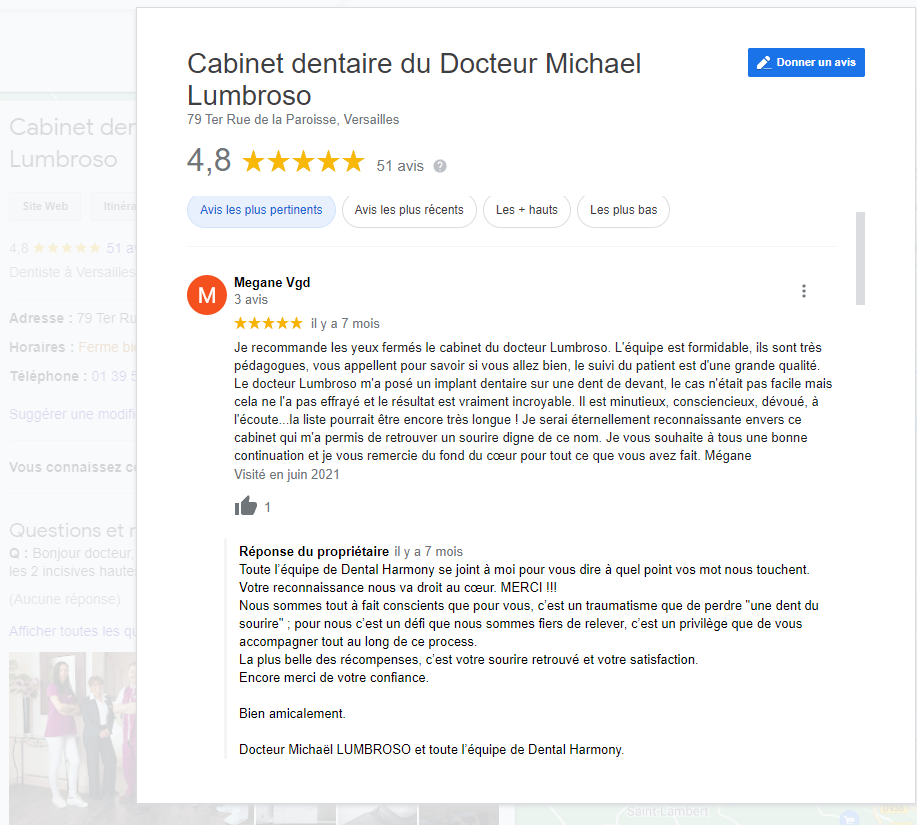
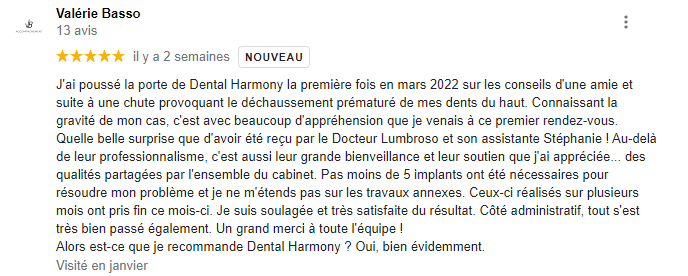
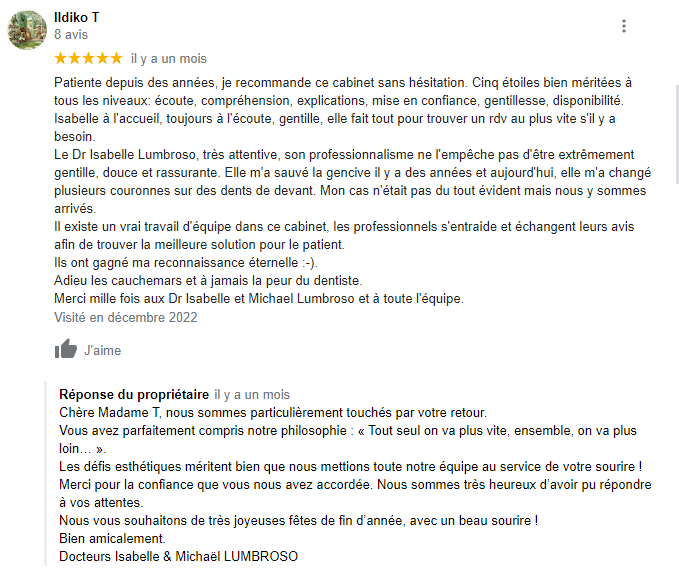
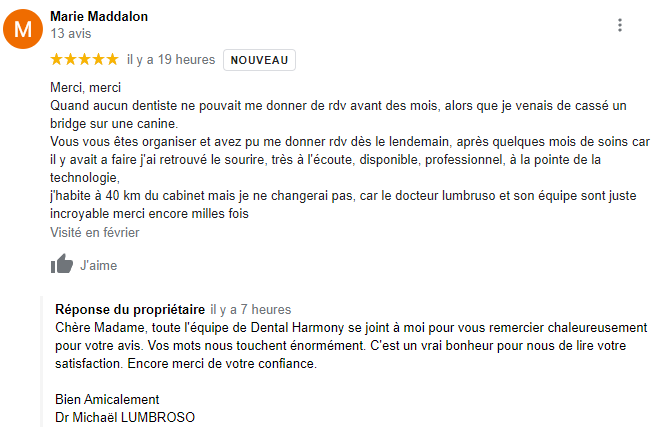
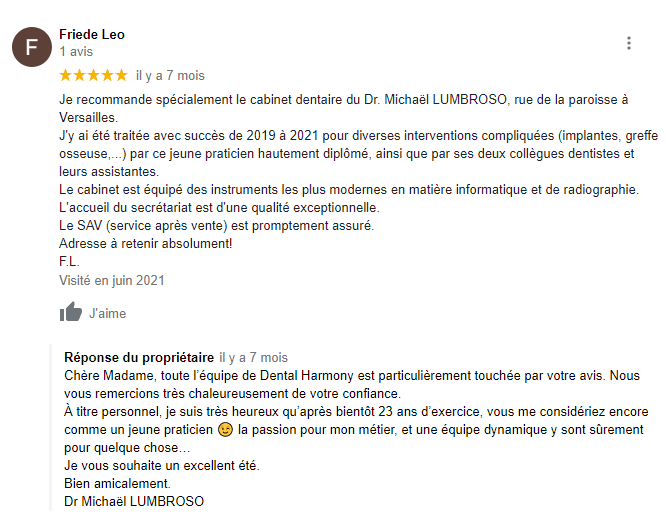
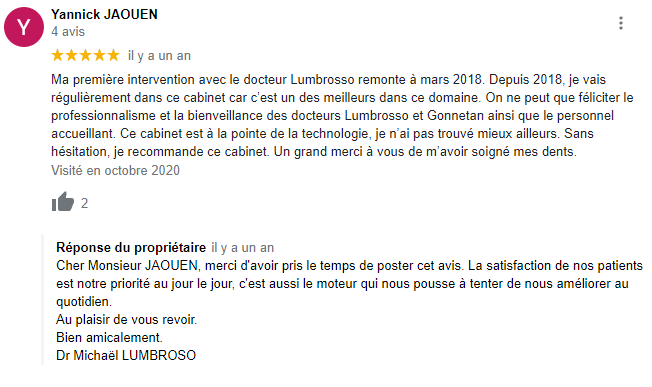
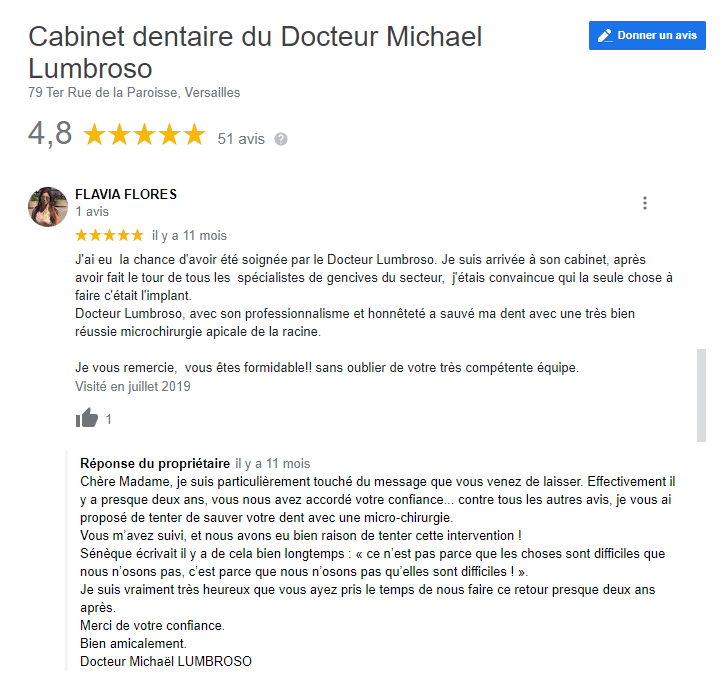
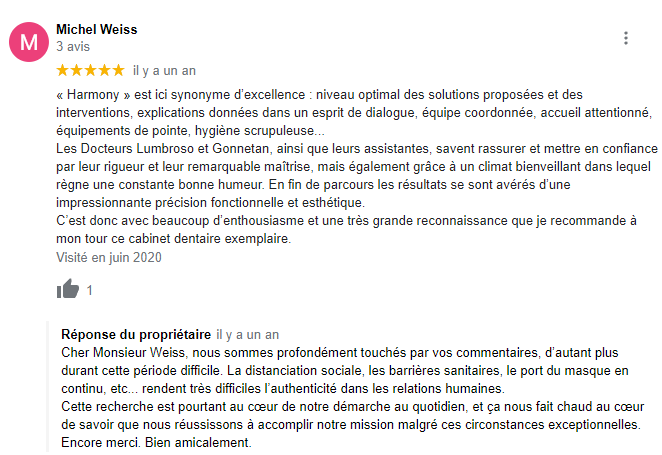
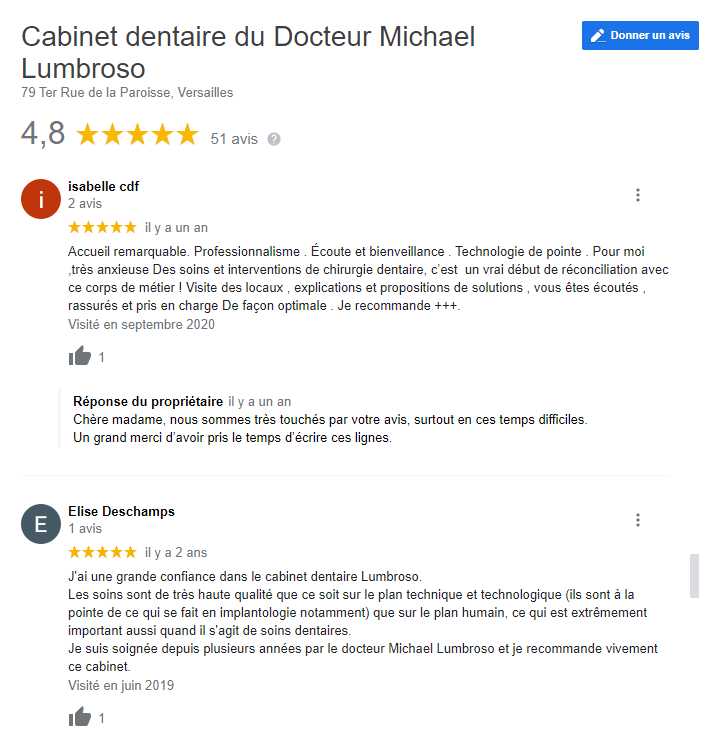
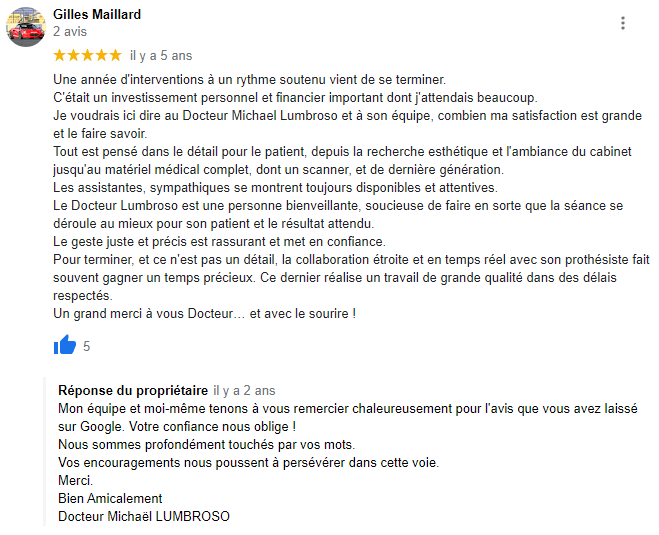
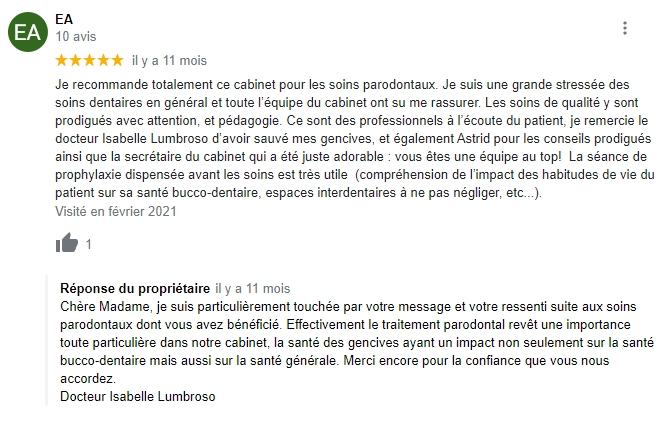
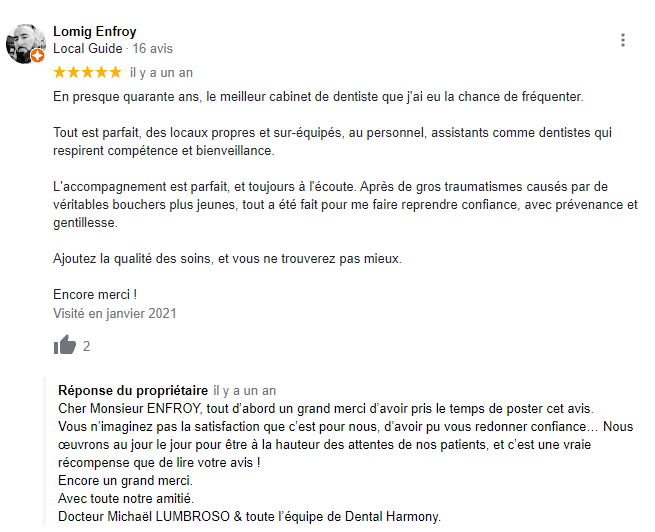
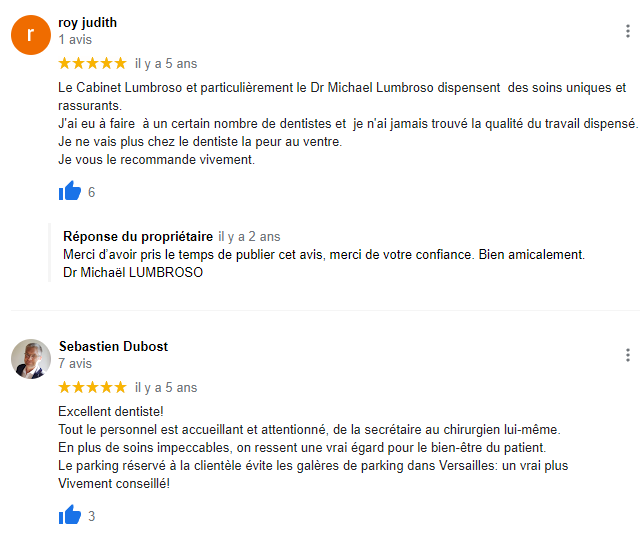
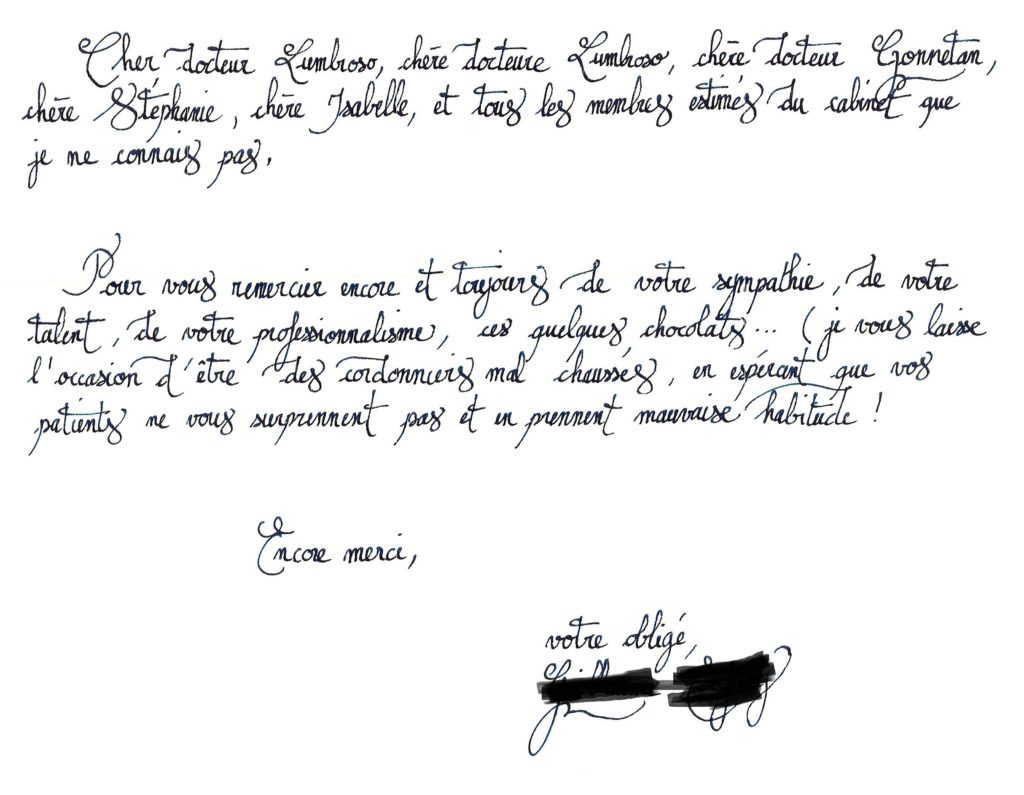
Watch the interview with Dr Michaël Lumbroso in the Grand Angle programme of 12 April 2013 broadcast on the Yvelines Première channel.
What should you do to look after your teeth?
This is the question that Dr. Michaël Lumbroso, a dental surgeon in Versailles, answered during the Grand Angle programme, broadcast on Friday 12 April 2013 on Yvelines Première, the main local television station in the Yvelines region.
You can now watch or re-watch the interview with Dr. Michaël Lumbroso by clicking on the video below:
For more transparency!!!
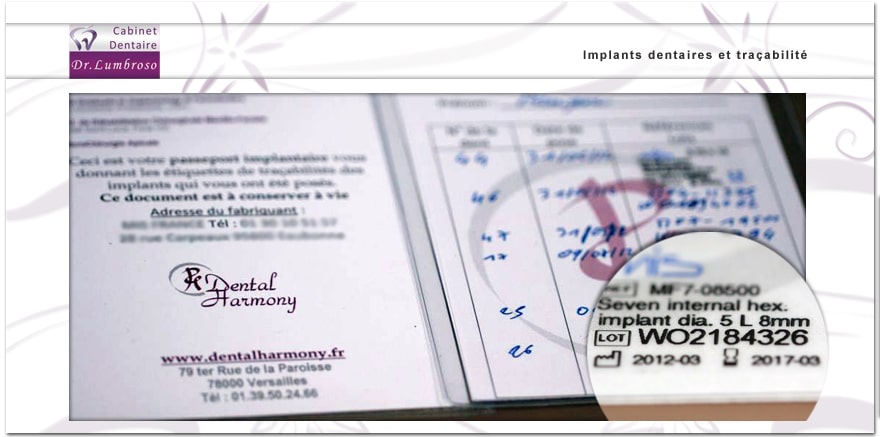
In my daily practice, I encounter an increasingly frequent and thorny problem. Many patients come to me to have their dentures replaced or repaired on implants that were placed 10 or 15 years ago. In absolute terms, this does not pose any problems, except when these patients have no idea of the type or brand of implants fitted! There are dozens of implant systems, and they are not compatible with each other! Even within the same brand, there are different connectors (internal hexagon, external hexagon, Morse taper, trilobate, octagon, etc.).
It is therefore essential that when implants are placed, you obtain this information, which is vital for the durability and follow-up of your restorations. Think that your practitioner/implantologist may retire, move, or give up his practice to a colleague, this precious information may be lost and complicate enormously your long-term follow-up. The loss of this information can turn the simple repair of a prosthesis into a real police investigation, to find the trail of the implants placed!
You should ask for this information when the implant is placed: what brand, what type of implant, what diameter, what connection?
Ideally, your practitioner/implantologist should give you an implant passport on the same day, containing all this data, and stick the traceability labels of your implants on it. This is what we do systematically for our patients.
All the major implant brands provide this information in the form of a traceability label, containing in addition to the information seen above, the serial number of the implant, its batch number, its date of manufacture and its expiry date!
It is also important that the chosen implant system is tracked over time.
Some companies may go bankrupt, or simply disappear, the parts are then no longer available! This is why we have selected a major brand of implants, and above all we have selected a connector that has proved its worth, that is very widespread in the world(internal hexagon) and that has fallen into the public domain, so there will always be manufacturers to ensure the follow-up of the necessary parts. So long live your implants!
Dr Michaël LUMBROSO
Implantologist - Periodontologist Versailles, 13 February 2013
Interview with Dr Michaël LUMBROSO, dental surgeon in Versailles, on the Yvelines Première channel, on 6 February 2015. In this interview, the different prosthetic possibilities are discussed, as well as dental implants and new technologies (3D modelling, Cone Beam, minimally invasive surgery, etc...).
Click on the image below to watch the programme.
Extracts:
Florence DÉCHELOTTE: To begin with, there are several types of dental prostheses. Can you present them to us?
Dr Michaël LUMBROSO: Before getting to the heart of the matter, I would like to say one thing, if you will allow me. Which seems fundamental to me: it is that somewhere, if we need a dental prosthesis, it is a bit of a failure.
Let me explain, let's go back to the cause. If you need a prosthesis, it's because the tooth is very damaged or has been extracted.
How did we get to this stage? There are not 36 possibilities...
There are two major diseases in the mouth: carious disease and periodontal disease, both of which are infectious and transmissible... which means that they could have been avoided!
Florence DÉCHELOTTE: On the subject of dental prostheses, why are they so expensive?
Dr Michaël LUMBROSO: First of all, I'm going to shock you: the price of dental prostheses in France is not the real problem! That's what we're being led to believe!
The REAL problem is why the French need dental prostheses so much!
The REAL problem is not having an inlay, the REAL problem is having 3 or 4 missing teeth to replace!
The REAL problem is that if we look at the percentage of the population that has all its teeth, France is in 17th position out of the 27 European countries!
Only 1 in 3 French people have all their teeth!
That is the REAL problem.
Do you know how many teeth are missing in our country?
60 million! that is to say an average of one tooth per patient.
Why have we reached this point? because there is no prevention, and in my profession, curative measures alone do not solve the problems. This is a pity, because in our profession, we have the means to treat our patients BEFORE they get sick!
Then, prosthesis is expensive, for a very simple reason: we have the cheapest care in Europe! Take a root canal on a molar for example in France the cost is defined by the social security, it is 81,94 €, you know how much it costs in Hungary for example? ..... 300 € !!!
It will seem crazy to you, but when your dental surgeon has to devitalize a tooth, it costs HIM money! Our treatment rates have been blocked at roughly the same price since the 1960s!
So there is a compensation phenomenon for prostheses.
And as the reference social security rate for prostheses has also remained blocked at the 1960s, well, the social security reimburses less and less proportionally.
And then there is a third point: take for example the installation of an implant, let's say about 1000 €, you know what costs the most out of these 1000 €?
All kinds of taxes and various levies! that represents about 1/3 of the global cost!
There is also the fact that our profession requires increasingly complex and expensive techniques, not to mention sterilisation, safety or radiation protection standards, etc... Our technical platforms are increasingly sophisticated, increasingly demanding, and they use resources that I would never have imagined just 15 years ago...
From 3D modelling using the Cone Beam, to the operating microscope, via lasers, optical impressions and CAD/CAM, our practice has nothing to do with that of the 20th century...
Dr Michaël LUMBROSO
Periodontologist - Implantologist in Versailles,
February 6, 2015
New partial removable dental prosthesis made of P.E.E.K (PolyEtherEtherKetone) or Acetal, by C.F.A.O (Computer Aided Design and Manufacturing).
When there are several teeth to replace in the mouth, there are several solutions:
- Bridges, but they are not always possible, at least one tooth must remain behind the bridge, and they often require the sacrifice of a healthy tooth. They place a sort of mortgage on the remaining teeth.
- The Dental implants are a solution of choice, but their cost can be significant, depending on the number, complexity of the case, etc... There may be medical contraindications, bone deficits that would require reconstructions that the patient does not want, etc...
- The third option is to make a partial removable appliance.
For more information on the 3 solutions, click here.
Until recently, these appliances consisted of a metal frame, and a resin part to hold the prosthetic teeth. The metal part is made of an alloy called Stellite™whose name has come to be equated with these braces which are commonly referred to as Stellites.
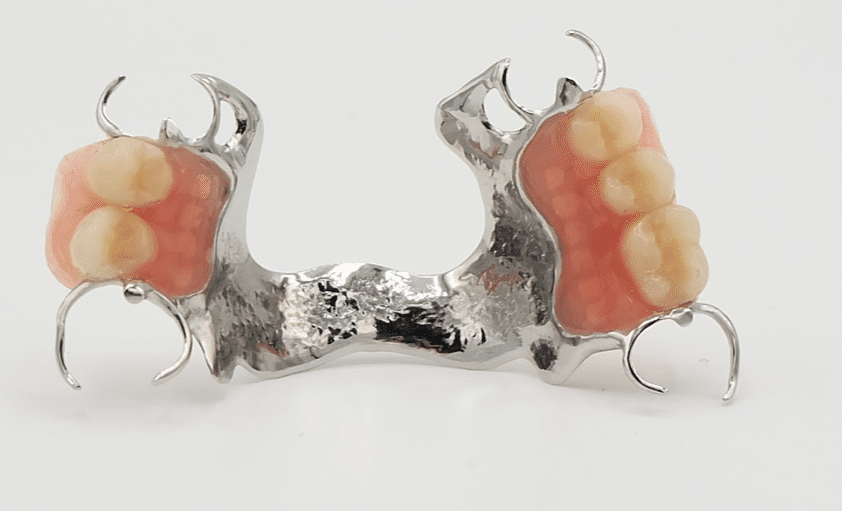
Stellite™is therefore an alloy of cobalt (50-65%), chromium (25-35%), tungsten (4-13%), carbon (1-2.5%) and other elements (molybdenum, nickel, iron, titanium).
It is important to note that cobalt is a metal that may be carcinogenic for humans, mutagenic and toxic for human reproduction (this is why in our practice we no longer use metal for crowns). Various French and European authorities have sounded the alarm. But to this day Stellite™ remains authorised in dental prostheses, although we are now obliged to inform you that this type of device contains cobalt. https://www.information-dentaire.fr/actualites/alliages-dentaires-cobalt-chrome-compatibilite-entre-le-cadre-reglementaire-europeen-et-la-convention-nationale/
Moreover, these Stellites are made using conventional techniques: (afirst physical impression to make an Individual Impression Tray, a second impression to make the frame, plaster casts, then making the frame using the lost wax technique, then putting the resin part in a muffle, etc.). All these steps are nowadays a bit archaic, long and tedious, they are also the source of inaccuracies which will add up to each other, and harm the precision of the adaptation of the whole... that's why it is often necessary to do touch-ups, and that these appliances have the reputation of generating injuries...
There is an alternative to all these problems: PEEK (polyetheretherketone, it is a thermostable semicrystalline thermoplastic) or Acetal (acetal is a synthetic polymer, obtained from formaldehyde). Dental appliances made with these materials have many advantages:
- These materials do not contain toxic products and have been used for a long time in orthopedics for cervical prostheses in particular;
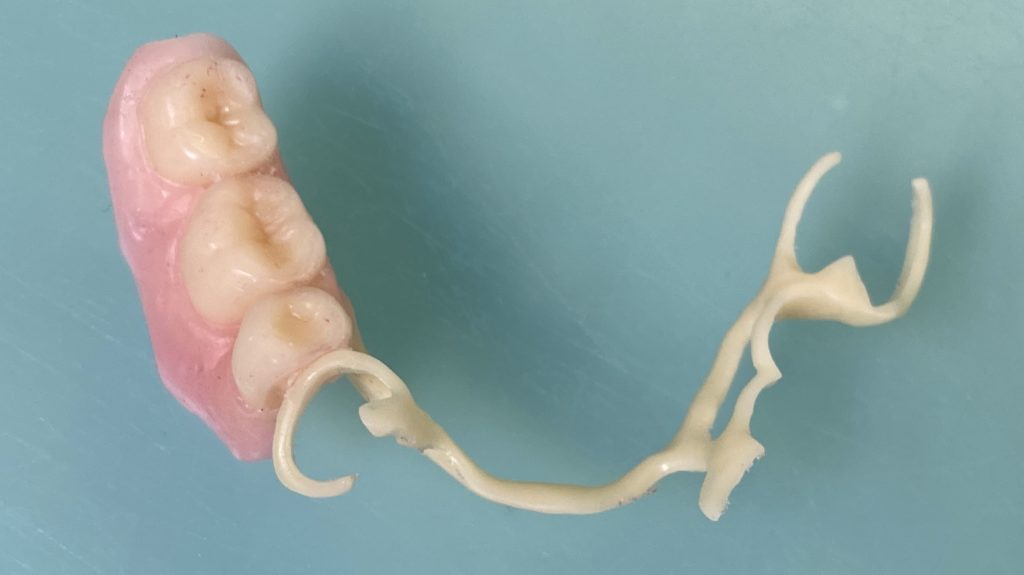
- they can be included in a CAD/CAM (Computer Aided Design and Manufacturing) chain, because they are machinable and printable materials. This means that we can take a optical, digital impression with our optical camera and send it to our prosthetist by internet;
- These modern means will greatly improve the accuracy, fit and stability of your device;
- these materials are much lighter (the frame weighs only a few grams!), your device will be more comfortable;
- The color of this material is more natural, so the clasps will be less visible. For Acetal, several shades are even available and we can copy the shade of your teeth.
But also some disadvantages:
- To date, devices made with these materials are not reimbursed by the CPAM, possibly by complementary organizations, but it is quite rare;
- These high-tech materials require advanced technical means for their implementation. This results in an additional cost of about 30%;
- these devices are more difficult to repair, they are less scalable because we can not make welds.
It is interesting to share here the opinion of a 78 year old patient, Mrs. P. who had been wearing a stellite for many years with several inconveniences, and who decided to replace it by a PEEK appliance recently.
" I am very satisfied, the device is stable, easy to put on, very light, the food does not pass underneath anymore. No more pain. Thank you "
Dr Michaël Lumbroso, a dental surgeon in Versailles, discusses the causality between periodontal disease and Alzheimer's disease, and the appropriate treatments to prevent periodontitis.
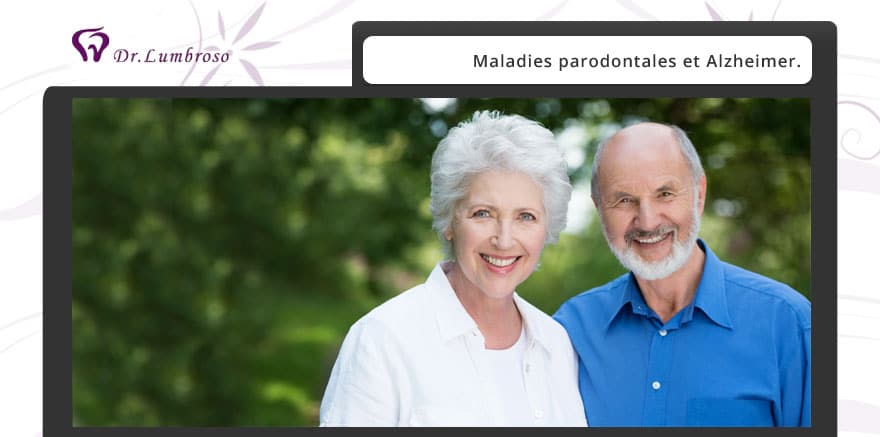
We have known for many years that periodontal and oral diseases have a real impact on a patient's general health : cardiovascular disorders, diabetes, risk of premature delivery, dietary imbalance, rheumatoid arthritis, even certain cancers...
However, a study conducted in 2013 by researchers from the University of Lancashire in the United Kingdom has established a link between periodontal disease and Alzheimer's disease.
To find this correlation, the researchers studied the brains of 20 patients within 12 hours of their deaths. Ten of these patients had Alzheimer's disease.
In 4 out of 10 cases, the scientists detected the presence of Porphyromonas gingivalisa bacterium clearly identified as responsible for advanced periodontal damage. The genes in Porphyromonas gingivalis bacteria alter the autophagy process in nerve cells, blocking the natural cell regeneration mechanism.
This is the first time that a serological marker of periodontitis has been linked to cognitive impairment.
However, previous studies in the US have shown a link between gum inflammation and an increased risk of cognitive decline in an older patient.
Preventing periodontal disease
Did you know that periodontal disease affects nearly eight out of ten adults?
Dental pain, loosening or even loss of teeth, psychological consequences, not to mention the various diseases and pathologies we have listed above... the consequences are numerous and potentially serious for people suffering from periodontitis.
Despite this alarming reality, this pathology is not a fatality and it is possible to treat it with adapted means, provided that prevention is given pride of place and that an effective treatment is followed.
Good dental hygiene is the basis of gum protection. This consists of brushing two to three times a day for three minutes. A soft-bristled toothbrush is recommended to avoid damaging the gums.
Scaling every six months or once a year will reduce plaque formation and prevent gingivitis. This mechanical treatment can be complemented by spraying with bicarbonate and salts and polishing the affected teeth.
When the patient reaches the stage of periodontitis, the dentist will use more aggressive techniques based on chemical treatment with antiseptics and the application of a bicarbonate and hydrogen peroxide paste, which the patient will use from the start of the treatment.
The practitioner will then resort to root planing, a root planing procedure that removes the deep tartar in the periodontal pockets and allows the affected teeth to re-adhere to the gum.
Post-treatment follow-up is based on controlling the risk of infection. It is important to know that gingivitis can be treated, whereas periodontitis, a much more serious stage of periodontal disease, can only be "stabilised". To complete a root planing, the patient can use antiseptic mouthwashes or even antibiotics, depending on the advice of his dentist.
In conclusion, periodontal disease and its impact on general health should not be neglected. Hence the importance of prevention, which involves rigorous dental hygiene and regular monitoring by your dentist.
Dr Michaël LUMBROSO
Implantologist - Periodontologist - Dental Surgeon in Versailles
Halitosis is not a fatality
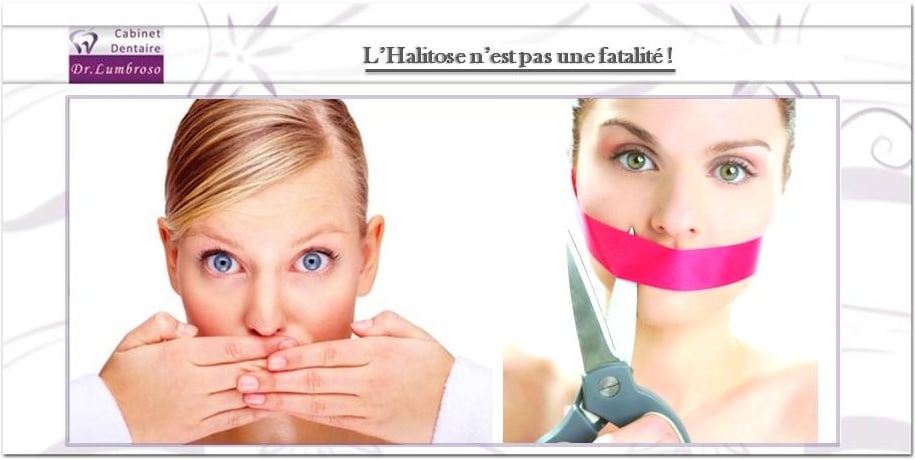
Bad breath, also called halitosis, is in most cases caused by bacteria in the mouth. Halitosis occasionally affects a large number of people. In this article, you will find our tips on how to combat this unpleasantness.
Causes of bad breath
Halitosis is an unpleasant odour from the mouth and in some cases from the nasal cavity. In about 90% of cases, the development of bacteria in the mouth and on the surface of the tongue is the cause of this bad breath.
Several factors can be involved in the formation of halitosis:
- Dental diseases: dental caries, periodontal disease (bacterial infections of the tissues supporting the teeth), gingivitis;
- Oral-nasal affections: angina, mycosis, rhinitis and sinusitis, caseum;
- Diet: garlic, onions, cheeses and cold cuts, as well as alcohol and coffee are all predisposing factors for bad breath. Food retention in the mouth can also cause halitosis;
- Tobacco. On this subject, you can read our article on the impact of smoking on oral health here
- Gastroesophageal reflux disease (GERD), which can also lead to tooth decay and lesions attributed to acid reflux;
The consequences of bad breath
The consequences of bad breath are primarily psychological. Indeed, halitosis can have serious repercussions on the individual's social life, both personally and professionally.
The appearance of halitosis should also alert you to your oral health. Indeed, the formation of this bad breath may be the consequence of more or less serious dental lesions: periodontitis, gingivitis, dental caries... The appearance of halitosis should also alert you to your oral health. Indeed, the formation of this bad breath may be the consequence of dental lesions of varying degrees of severity: periodontitis, gingivitis, dental caries, etc.
Knowing that 50% of French people have gingivitis and 20% have periodontitis (see here), the appearance of halitosis may be a sign of the onset of these pathologies
What are the solutions for halitosis?
Fortunately, there are several solutions, remedies and treatments to combat bad breath effectively.
In most cases, halitosis is the result of poor oral hygiene. By following the basic rules of hygiene, i.e. brushing your teeth three times a day after each meal, you can make a big step towards fresh breath. To accompany tooth brushing, you can use interdental brushes or dental floss, which will allow you to clean the areas of the mouth that cannot be reached with a conventional toothbrush, and to remove any food debris stuck between the teeth. You can also use a toothbrush with a built-in tongue scraper to clean the surface of your tongue and remove as much bacteria as possible. Mouthwashes are also effective in treating bacteria that form in the mouth. Finally, it is recommended that you visit your dentist at least once a year. If you have dental lesions, brushing your teeth and chewing "fresh breath" gum will not be enough. Your dentist will be able to identify the causes of your halitosis and provide the necessary care.
By putting this advice into practice, you will quickly notice an improvement in the state of your breath!
Dr Michaël LUMBROSO
Implantologist - Periodontologist - Dental Surgeon in Versailles
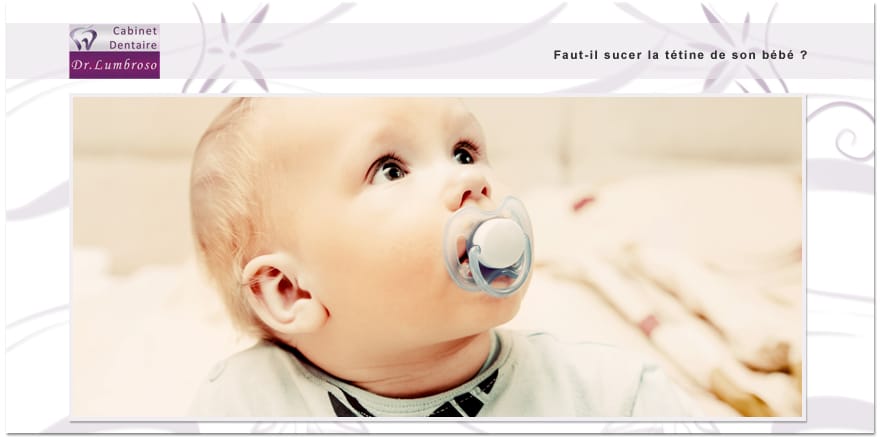
Parents who clean dummies by putting them in their mouths would have less allergic children than others...
I recently read on LeFigaro.fr a very interesting article about baby teats and their impact on the child's exposure to various pathogens. This article is a popularisation of a very serious Swedish study published in the very serious journal Pediatrics.
To summarise the conclusions of this study (and many others that follow the same line), it is clear that exposing infants to different pathogens helps them develop immunity and reduces allergies.
But should you suck your baby's dummy to clean it?
From my point of view, the answer is NO! And twice NO, for two main reasons. These two NOs are closely linked to the two main risks of pathology that we encounter daily in our patients' mouths.
Firstly, the risk of caries: we have known for a long time that dental caries is initiated by two main bacteria (see our sheet on dental caries hereand the interview with Dr LUMBROSO on this subject here) : Streptococcus Mutans, and Lactobacillus Acidophilus. Even if we know the importance of food, acidity, hygiene, etc. in the development of caries, we must understand that without bacteria, there can be no caries!
However, at birth the mouth of the infant is sterile! It is free of all bacteria! The oral bacterial flora is acquired, it is not innate; and this oral flora will evolve throughout life, and in particular during the appearance of the first teeth.
It is also important to know that approximately 80% of the world's population is a carrier of these cariogenic bacteria, and it is precisely by this kind of gesture (or by tasting the child's food with the same spoon...) that we transmit these famous bacteria to the child!
Secondly, the periodontal risk This is the second most common oral disease in France! It consists of gingivitis and periodontitis or more simply of tooth loosening. More than 50% of the French population has a Gingivitis (superficial infection of the gum) and 20% of the adult population in France is affected by Periodontitis (deeper infection leading to bone loss)!
But what is less well known is that the cause of these affections (which can lead to the loss of all the teeth...) is essentially of bacterial origin! Even if poor hygiene and smoking are the main risk factors, the origin of the problem is most of the time a bacterial imbalance, with the appearance of highly pathogenic bacteria. For example,Actinobacillus Actinomycetemcomitans (Aa ); a particularly virulent bacterium, incriminated in certain forms of aggressive periodontitis, notably juvenile periodontitis.
We have known since the 1990s that these bacteria are mainly transmitted by parents! This means that the oral health status of parents is a major element in the prevention of these diseases, and that everything must be done to limit these transmissions. So even if it could reduce allergies, the consequences of these bacterial transmissions are so serious that I think we must do everything we can to avoid these behaviours that lead to the contamination of our children by pathogenic bacteria.
I think that we must teach our children not to drink from the same bottle or glass as another person; that we must not share the same cutlery, etc... and that without going to the extreme of sterilising teats and other bottles, we must refrain from "cleaning" our children's teats by sucking on them!
Dr Michaël LUMBROSO
Implantologist - Periodontologist
Dental Surgeon in Versailles
Sucking on your baby's dummy reduces the risk of allergy
By Delphine Chayet - le 21/05/2013 LeFigaro.fr
Parents who clean dummies by putting them in their mouths are said to have less allergic children than others.
It is now accepted that exposure to bacteria in early childhood, probably because it stimulates the immune system, reduces the risk of allergy. A Swedish study published in the scientific journal Pediatrics provides a new example in a previously unexplored area. It suggests that children whose parents have developed the habit of sucking on a dummy before putting it back in their toddler's mouth are less likely to develop allergies, asthma and eczema than others.
The researchers recruited 184 children at high risk of allergy and followed them until they were 3 years old. Their parents were asked about breastfeeding and food diversification during an initial interview six months after birth. The use of a dummy was also recorded, as well as the way it was cleaned: dipped in boiling water, rinsed or sucked by the parents. Of the 123 babies who had a dummy, 65 were in the latter situation.
Examination of the children at 18 months revealed that those whose dummies had been "cleaned" in the parents' mouths had a reduced risk of eczema and a significantly reduced risk of asthma and allergies. According to the authors of the study, this phenomenon "is probably due to an early stimulation of the child's immune system by the germs transmitted in the parent's saliva". The authors, who analysed the salivary flora of a group of children aged 4 months, also found significant differences in the variety of bacteria present in the children's saliva, depending on whether or not their parents sucked on their dummy.
Transmission of viruses
"This result is very interesting, but we should not conclude that it is a good habit," notes Dr Bertrand Delaisi, deputy secretary general of the French Paediatric Society. Sucking on your child's dummy exposes them to the risk of transmitting viruses, such as the respiratory syncytial virus (which causes bronchiolitis) or herpes. It also increases the risk of tooth decay, which is linked to the presence of certain bacteria. It is therefore surprising that so many parents have this reflex in a Nordic country that is very respectful of hygiene standards.
The study, although small in number, tends to support the popular theory that adherence to high hygiene standards has the perverse effect of inhibiting the development of a child's immune system. Studies on Bavarian farms have shown that exposure to bacteria reduces the risk of allergy. Conversely, children born by caesarean section have been shown to be more vulnerable than those born by vaginal delivery, with exposure to many germs.
Bibliography:
- Pacifier Cleaning Practices and Risk of Allergy Development Bill Hesselmar, Fei Sjöberg, Robert Saalman, Nils Åberg, Ingegerd Adlerberth and Agnes E. Wold; originally published online May 6, 2013; Pediatrics DOI: 10.1542/peds.2012-3345
- National Survey 2002-2003 (NPASES I) organised by the U.F.S.B.D. in collaboration with CETAF under the scientific direction of Prof. Denis Bourgeois.
- http://www.ufsbd.fr/wp-content/uploads/2014/04/Dossier-de-Presse-PARO-2007.pdf
- Asikainen S., Chen C., Slots J. Likelihood of transmitting Actinobacillus actinomycetemcomitans and Porphyromonas gingivalis in families with periodontitis. Oral Microbiol.Immunol. 1996;11(6):387-394.
- Saarela M., Troil-Linden B., Torkko H., Stucki A.M., Alaluusua S., Jousimies-Somer H., Asikainen S. Transmission of oral bacterial species between spouses. Oral Microbiol.Immunol. 1993;8(6):349-354.
- Petit M.D., van Steenbergen T.J., Scholte L.M., van der Velden U., de Graaff J. Epidemiology and transmission of Porphyromonas gingivalis and Actinobacillus actinomycetemcomitans among children and their family members. A report of 4 surveys. J.Clin.Periodontol. 1993;20(9):641-650.
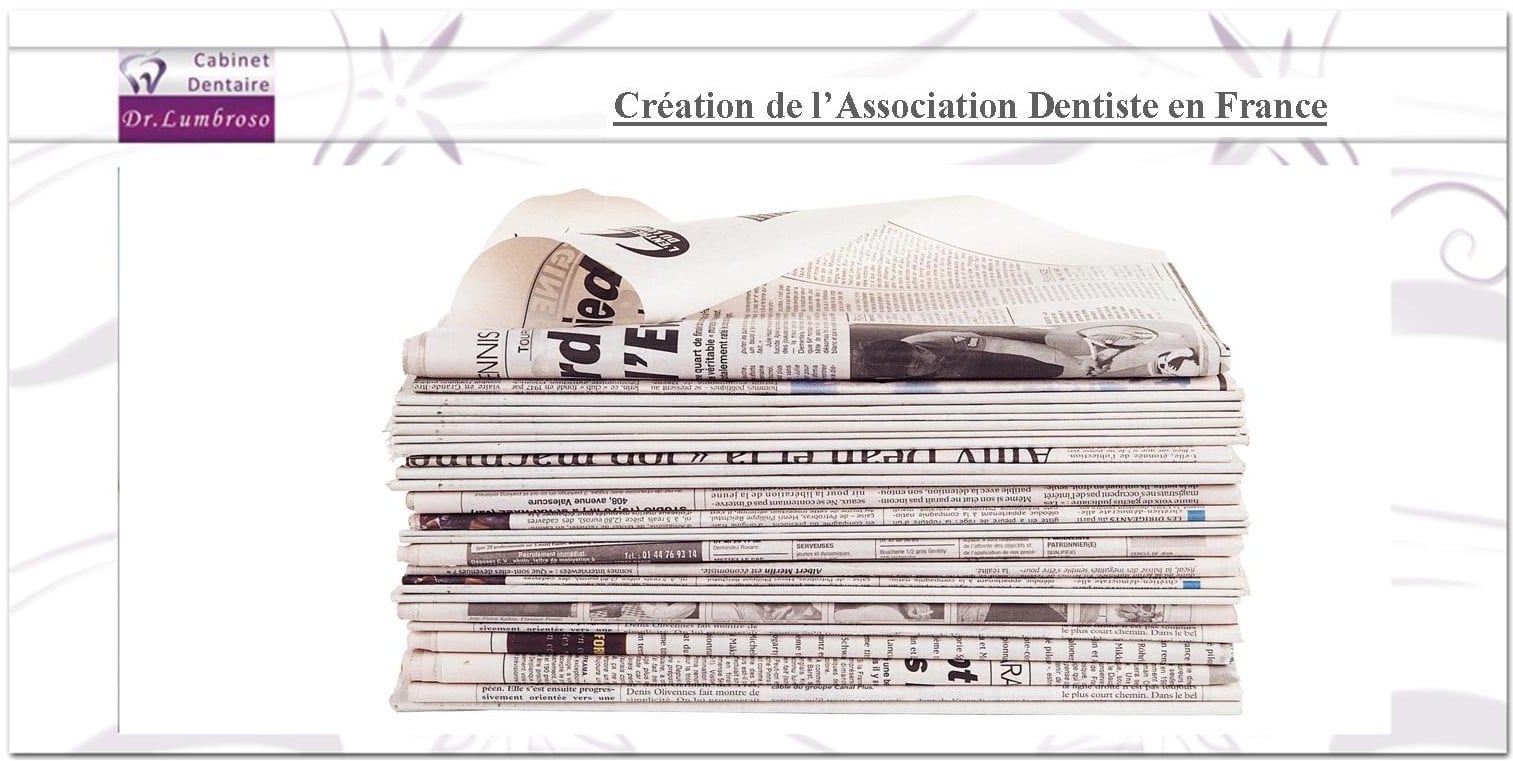
Press Release
Association Dentiste en France
The quality of French dentistry is praised throughout the world: its know-how, its technological and medical advances, its renowned practitioners who are advancing the world of dentistry, its sense of aesthetics based on the search for natural integration, all these virtues make it a leading edge dentistry, which is a credit to France.
And yet in our country the dental world is ill:
- A large proportion of French practitioners are demotivated, feeling abandoned, misunderstood by the public authorities, powerless in the face of unfair competition from foreign countries, crushed under the growing weight of constraints, charges and regulations, and caught in a vice between increasingly vindictive mutual insurance companies and Health Insurance blinded by short-term management.
- As for the patients, they no longer understand the logic of our health system, access to dental care is increasingly difficult for them, they have the feeling that nobody is defending their interests, their health. They are being held hostage by a press that is looking for scoops and sensationalism, which is turning a population against its dentists and giving a mercantile and unfair image of this profession.
Faced with this situation and the lack of understanding between the various players in this sector, practitioners who share the same vision have decided to create an association: Dentiste en France.
The aim of this association is to defend French dentistry based on a Quality approach, on the well-being of our patients, on the development of Prevention and Prophylaxis, because today we know how to "look after our patients before they get sick!
We want to promote a modern dentistry, more medicalized, at the crossroads of aesthetics, nutrition, early detection, and other medical disciplines, this is what we call the Global Approach.
The practice of dentistry is not limited to repairing teeth, its mission is to preserve and sometimes restore oral health, so that we all keep smiling!
Our ambition is to restore a positive image of French dentistry, an image that reflects the reality of the 40,000 dentists who fight every day to improve the quality of life of their patients, while respecting medical ethics.
We also wish to defend our patients, their interests, their health, their rights, in the face of actors with ambiguous intentions... We want to defend their freedom, the freedom to choose their practitioner freely; and the best guarantee of this freedom is none other than the preservation of a Liberal and Independent dentistry.
We are aware of the current constraints linked to the crisis (budgetary restrictions, ailing public finances, the "social security hole", declining purchasing power, etc.) but we are convinced that short-term accounting management of public health alone will not solve the problems.
The implementation of a virtuous system based on Quality and Prevention is one of the only serious ways to improve the oral health of our fellow citizens, to facilitate access to care for all, and thus to lower the overall bill for dental care.
Thus allowing us all to emerge from this crisis as winners!
Dr Michaël LUMBROSO
President of the Association Dentiste en France
RNA N°: W784003399
Versailles, 13 May 2013
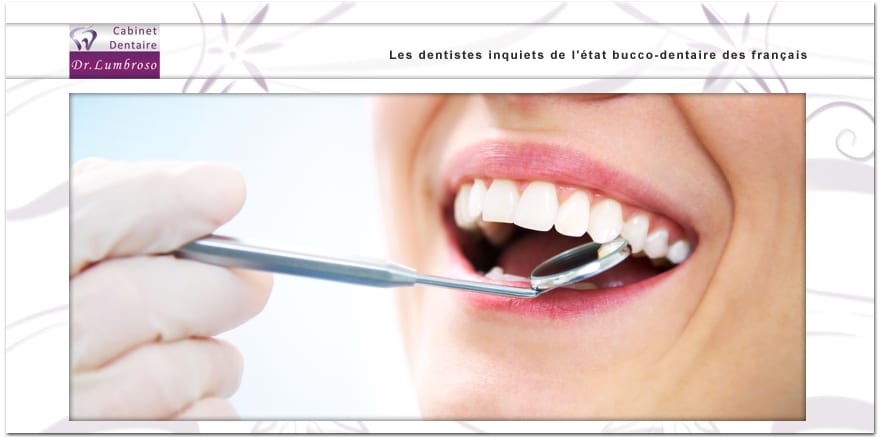
Too many French people are losing their teeth prematurely. This is the cry of alarm launched by the French Union for Oral Health (UFSBD), on the occasion of World Oral Health Day on 20 March. The cause: the lack of hygiene, prevention, care, means and political will.
Losing your teeth in France in 2013 is an intolerable reality for dentists! And they are keen to make this known, through the French Union for Oral Health (UFSBD), which deplores the delay in the fight against periodontal disease (infection of the gums and tissues supporting the teeth).
Although oral health has generally improved in France in recent years, dentists are still concerned about the health of adults. A 2010 European Commission study on the dental health of Europeans found that only 34% of French people over the age of 15 claim to have all their natural teeth, putting our country well below the continental average of 41%, well behind the UK (50%) and Spain (47%).
Sophie Dartevelle, president of the UFSBD, regrets that public policies have focused too much on young people, to the detriment of adults who tend to neglect their oral hygiene. With the more or less serious consequences that we know: periodontal diseases, caries formation, gingivitis, tooth loss.
Focus on prevention and hygiene
Unfortunately, these figures reflect a certain neglect of dental hygiene in France. One adult in ten does not even brush his or her teeth once a day! And there is always a good reason for putting off the annual visit to the dentist: financial problems, fear of pain, etc. Bad calculation, because putting off the problem only makes it worse. And when dental pain occurs, it is already too late!
French dentists are sounding the alarm about the increase in periodontal disease, which particularly affects pregnant women, the elderly, people with chronic illnesses, people in precarious situations and the disabled. Periodontal diseases are responsible for 14,000 deaths per year in France.
In fact, periodontal diseases are important risk factors for many other pathologies: cardiovascular diseases, type 2 diabetes, rheumatoid arthritis, premature births, etc. Read our fact sheet on the links between diabetes and periodontal diseases here.
More than 50% of the French population has a Gingivitis (superficial gum infection) and 20% of the adult population in France has Periodontitis (deeper infection leading to bone loss)!
In order to prevent the risks of periodontitis, it is recommended to carefully brush the teeth three times a day after each meal and to consult a dentist once or twice a year.
Dr Michaël LUMBROSO
Implantologist - Periodontologist - Dental Surgeon in Versailles
- Source : Le Point.fr - Published on 20/03/2013 at 06:15: "The French lose more teeth than their neighbours"
- National survey of 2002-2003 (NPASES I) organised by the U.F.S.B.D. in collaboration with the CETAF under the scientific direction of Prof. Denis Bourgeois here
